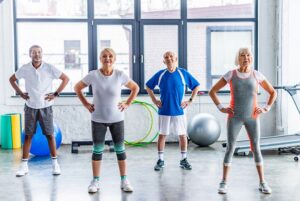 Aerobic training is known to control blood pressure more effectively when done in the evening compared to the morning. Researchers in Brazil at the University of São Paulo’s School of Physical Education and Sports (EEFE-USP) found that exercising in the evening helps regulate blood pressure better due to improved cardiovascular control by the autonomic nervous system through a mechanism called baroreflex sensitivity. Their study was published in The Journal of Physiology.
Aerobic training is known to control blood pressure more effectively when done in the evening compared to the morning. Researchers in Brazil at the University of São Paulo’s School of Physical Education and Sports (EEFE-USP) found that exercising in the evening helps regulate blood pressure better due to improved cardiovascular control by the autonomic nervous system through a mechanism called baroreflex sensitivity. Their study was published in The Journal of Physiology.
Leandro Campos de Brito, the study’s lead author, explained that there are many ways to regulate blood pressure. While morning training had benefits, only evening training enhanced short-term blood pressure control by improving baroreflex sensitivity. This improvement is significant because baroreflex control positively impacts blood pressure regulation, and there are no medications available to modulate this mechanism.
Advertisement
The study was part of Brito’s postdoctoral research, funded by FAPESP and supervised by Professor Cláudia Lúcia de Moraes Forjaz at EEFE-USP. In this study, 23 elderly patients with hypertension were randomly divided into two groups: one group trained in the morning, and the other in the evening. Both groups exercised for ten weeks at moderate intensity on a stationary bicycle. Each week, they completed three 45-minute sessions.
Researchers analyzed key cardiovascular parameters after ten minutes of rest, such as systolic blood pressure, diastolic blood pressure and heart rate. Data was collected before and at least three days after the ten-week training period ended. They also monitored mechanisms related to the autonomic nervous system. These were muscle sympathetic nerve activity (which controls blood flow in muscles) and sympathetic baroreflex sensitivity (which manages blood pressure by adjusting muscle sympathetic nerve activity).
All four parameters improved in the evening training group: systolic and diastolic blood pressure, muscle sympathetic nerve activity, and sympathetic baroreflex sensitivity. In contrast, the morning training group showed no improvements in systolic blood pressure, muscle sympathetic nerve activity, or sympathetic baroreflex sensitivity.
Evening exercise was more effective at enhancing cardiovascular autonomic regulation and lowering blood pressure, partly due to better baroreflex sensitivity and reduced muscle sympathetic nerve activity in the evening.
Brito mentioned that baroreflex control is the key factor making evening training more beneficial from a cardiovascular perspective since it leads to other positive outcomes. However, more research is needed to understand the mechanisms involved fully.
Advertisement
Baroreflex sensitivity controls heartbeat intervals and autonomic activity throughout the body. When blood pressure drops, it signals the brain to make the heart beat faster, and arteries contract more. When blood pressure rises, it signals the heart to slow down and arteries to relax.
Previous studies by the EEFE-USP group showed that evening aerobic training was more effective in reducing blood pressure in hypertensive men than morning training. This was linked to reduced systemic vascular resistance and systolic pressure variability.
Brito, now a professor at Oregon Health & Science University, noted that replicating these results in different groups of hypertensive patients and using more precise evaluation techniques has strengthened the conclusion that evening aerobic exercise is more beneficial for the autonomic nervous system in hypertensive patients, especially those resistant to medication.
